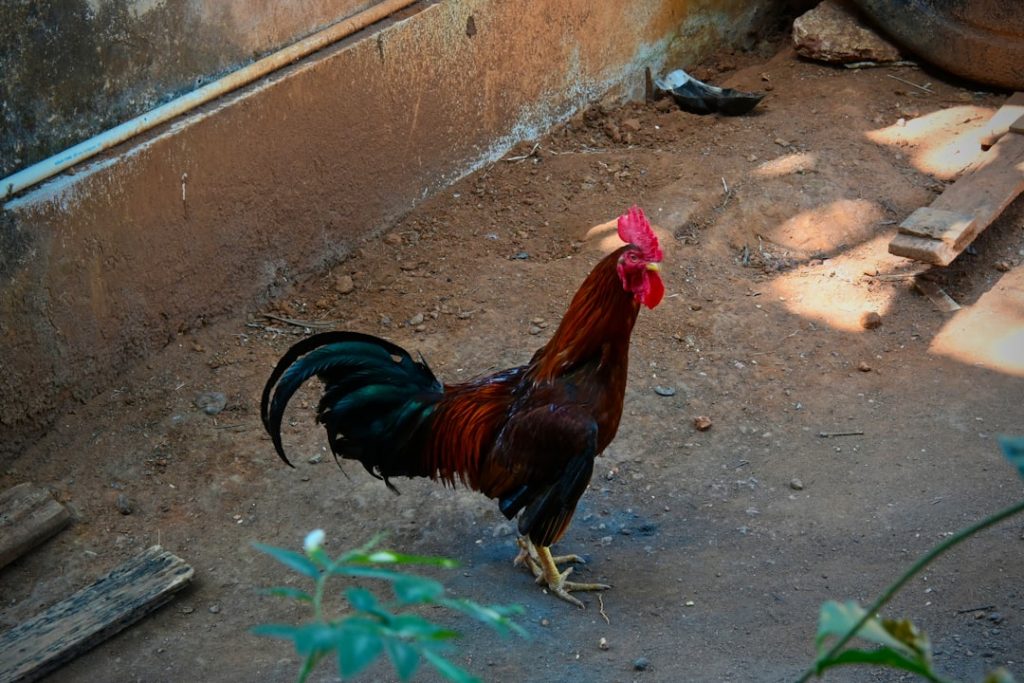Gamecocks, or fighting chickens, have been part of human history for millennia. The practice of cockfighting, where two roosters are pitted against each other in combat, has been documented in various ancient civilizations, including Greece, Rome, and several Asian cultures. In ancient Rome, cockfighting was a popular spectacle, often held in amphitheaters as mass entertainment.
The development of fighting chickens is closely linked to the history of domestication and selective breeding. Over time, breeders have selectively bred gamecocks for specific traits such as strength, agility, and combat ability. This process has resulted in the creation of distinct breeds of fighting chickens, each with unique characteristics.
While cockfighting is now illegal in many countries due to animal welfare concerns, the breeding and raising of gamecocks remains a cultural tradition in some parts of the world. The practice continues to be a subject of debate, balancing cultural heritage against modern ethical considerations regarding animal treatment.
Table of Contents
Key Takeaways
- Fighting chickens have a long history dating back to ancient times, with evidence of their use in various cultures for sport and entertainment.
- When selecting breeding stock, it is important to choose birds with strong physical attributes, good health, and a history of successful fighting.
- Creating the ideal breeding environment involves providing proper nutrition, space, and protection from predators to ensure the health and well-being of the chickens.
- Understanding genetics and bloodlines is crucial in breeding fighting chickens to maintain desirable traits and improve the overall quality of the birds.
- Caring for chickens during breeding involves monitoring their health, providing proper nutrition, and ensuring they have a stress-free environment to encourage successful breeding.
Selecting the Right Breeding Stock
Desired Traits and Characteristics
When breeding fighting chickens, selecting the right breeding stock is crucial to producing strong and healthy offspring. Breeders should look for gamecocks that exhibit the desired traits and characteristics, such as strength, agility, and a strong fighting instinct.
Temperament and Behavior
In addition to physical traits, breeders should also consider the temperament and behavior of the breeding stock. Gamecocks that are aggressive, confident, and assertive are more likely to produce offspring with similar traits. It’s also important to consider the overall health and vitality of the breeding stock, as this will impact the health and vigor of the offspring.
Increasing the Chances of Success
By carefully selecting the right breeding stock, breeders can increase the chances of producing high-quality fighting chickens with the desired traits and characteristics.
Creating the Ideal Environment for Breeding

Creating the ideal environment for breeding fighting chickens is essential for ensuring the health and well-being of the breeding stock and their offspring. The breeding environment should be clean, spacious, and well-ventilated to prevent the spread of disease and ensure optimal conditions for breeding. It’s important to provide nesting boxes or areas where hens can lay their eggs in a comfortable and secure environment.
In addition to physical space, breeders should also consider the social dynamics within the breeding environment. Gamecocks are territorial animals, so it’s important to provide separate living spaces for each breeding pair to prevent aggression and fighting. Providing ample access to fresh water and high-quality feed is also essential for maintaining the health and vitality of the breeding stock.
By creating an ideal environment for breeding, breeders can ensure that their fighting chickens are able to thrive and produce healthy offspring.
Understanding Genetics and Bloodlines
Understanding genetics and bloodlines is crucial for successful breeding of fighting chickens. Breeders should have a thorough understanding of dominant and recessive traits, as well as how these traits are passed down from parent to offspring. By understanding the genetic makeup of their breeding stock, breeders can make informed decisions about which pairs to breed in order to produce offspring with the desired traits and characteristics.
In addition to genetics, breeders should also have a deep understanding of bloodlines and pedigrees. Keeping detailed records of the lineage of their breeding stock can help breeders track the traits and characteristics that are passed down through generations. By carefully selecting breeding pairs with compatible bloodlines, breeders can increase the likelihood of producing high-quality fighting chickens with strong genetic traits.
Caring for Chickens During Breeding
Caring for chickens during the breeding process is essential for ensuring the health and well-being of both the breeding stock and their offspring. It’s important to provide a balanced diet that is rich in protein, vitamins, and minerals to support the health and vitality of the breeding stock. Additionally, providing access to fresh water at all times is crucial for maintaining hydration and overall health.
During the breeding process, it’s important to monitor the behavior and interactions between breeding pairs. Aggressive or overly dominant behavior can lead to stress and injury, so it’s important to provide separate living spaces for each pair to prevent conflict. Additionally, providing a quiet and stress-free environment can help encourage successful breeding and nesting behaviors in hens.
Managing Breeding Risks and Challenges

Breeding fighting chickens comes with its own set of risks and challenges that breeders must be prepared to manage. One common challenge is infertility or low fertility in breeding pairs, which can be caused by a variety of factors such as age, health issues, or environmental stress. Breeders should work closely with a veterinarian to identify and address any underlying health issues that may be impacting fertility.
Another challenge in breeding fighting chickens is managing aggression between breeding pairs. Gamecocks are naturally territorial and aggressive animals, so it’s important to provide separate living spaces for each pair to prevent conflict. Additionally, closely monitoring interactions between pairs can help prevent injury and stress during the breeding process.
Ethical Considerations in Breeding Fighting Chickens
When it comes to breeding fighting chickens, ethical considerations are an important aspect that breeders must take into account. While the practice of cockfighting is illegal in many parts of the world due to concerns about animal cruelty, there are still ethical considerations to be mindful of when breeding fighting chickens for other purposes such as exhibition or traditional cultural practices. Breeders should prioritize the health and well-being of their chickens at all times, providing them with a comfortable living environment, access to proper nutrition and veterinary care, and ensuring that they are not subjected to unnecessary harm or suffering.
Additionally, breeders should be mindful of the genetic diversity and overall welfare of their breeding stock, avoiding inbreeding practices that can lead to health issues in offspring. In conclusion, breeding fighting chickens requires careful consideration of genetics, bloodlines, environmental factors, and ethical considerations. By selecting the right breeding stock, creating an ideal environment for breeding, understanding genetics and bloodlines, caring for chickens during breeding, managing risks and challenges, and prioritizing ethical considerations, breeders can work towards producing healthy and high-quality fighting chickens while upholding ethical standards for animal welfare.
If you’re interested in breeding fighting chickens, you may also want to consider the importance of providing a safe and comfortable environment for your birds. This article on chicken coop nest boxes offers valuable insights on how to create the ideal living space for your chickens. Ensuring that your chickens have a secure and cozy coop can contribute to their overall well-being and productivity. For more information on poultry care and management, visit Poultry Wizard. And if you’re also raising geese alongside your chickens, you may be curious about whether geese can eat chicken feed. Check out this article on Poultry Wizard to learn more about this topic.
FAQs
What are fighting chickens?
Fighting chickens, also known as gamecocks, are a breed of chicken that has been selectively bred for aggressive traits and fighting ability. They are often used in organized cockfighting events.
Is it legal to breed and raise fighting chickens?
Cockfighting is illegal in many countries and is considered animal cruelty. Breeding and raising fighting chickens for the purpose of participating in cockfighting is illegal in most places.
What are some characteristics of fighting chickens?
Fighting chickens are typically smaller in size with strong, muscular bodies. They have a fierce and aggressive temperament, and are known for their fighting instincts and abilities.
How are fighting chickens bred?
Breeding fighting chickens involves selecting birds with desirable traits such as aggression, strength, and stamina. These traits are then passed down to the offspring through selective breeding.
Are there any ethical concerns with breeding fighting chickens?
Breeding fighting chickens for the purpose of participating in cockfighting is widely considered unethical and inhumane. It is important to prioritize the well-being and humane treatment of all animals.
Meet Walter, the feathered-friend fanatic of Florida! Nestled in the sunshine state, Walter struts through life with his feathered companions, clucking his way to happiness. With a coop that’s fancier than a five-star hotel, he’s the Don Juan of the chicken world. When he’s not teaching his hens to do the cha-cha, you’ll find him in a heated debate with his prized rooster, Sir Clucks-a-Lot. Walter’s poultry passion is no yolk; he’s the sunny-side-up guy you never knew you needed in your flock of friends!







